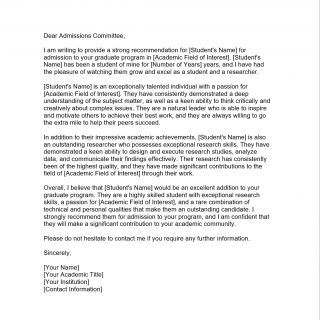Graduate School Recommendation Letter
A Graduate School Recommendation Letter is a document written by a professor, academic advisor, or employer on behalf of a student who is applying to graduate school. The main purpose of this form is to highlight the student's academic achievements, research skills, and potential for success in their chosen field.
This form typically consists of several parts, including an introduction, a description of the student's academic achievements, research skills, and potential for success, and a conclusion. Important fields to consider when completing this form include the student's name, academic field of interest, and contact information, as well as the name and contact information of the person providing the recommendation.
When filling out the form, it is important to provide specific examples of the student's academic achievements and research skills, as well as any relevant coursework or projects that demonstrate their potential for success in graduate school. Additional documents that may need to be attached include the student's resume or CV, transcripts, and any relevant writing samples or research papers.
Examples of applications for this form include graduate school applications, scholarship applications, and applications for research positions. Practice and use cases include using this form as a way to help a student secure admission to a competitive graduate program, or to provide a reference for someone who is seeking a research position or scholarship.
Strengths of this form include its ability to provide a detailed and personalized recommendation for the student, which can help them stand out to graduate school admissions committees. Weaknesses may include the potential for bias or subjectivity in the recommendation, as well as the time and effort required to complete the form.
Sample of Graduate School Recommendation Letter
Dear Admissions Committee,
I am writing to provide a strong recommendation for [Student's Name] for admission to your graduate program in [Academic Field of Interest]. [Student's Name] has been a student of mine for [Number of Years] years, and I have had the pleasure of watching them grow and excel as a student and a researcher.
[Student's Name] is an exceptionally talented individual with a passion for [Academic Field of Interest]. They have consistently demonstrated a deep understanding of the subject matter, as well as a keen ability to think critically and creatively about complex issues. They are a natural leader who is able to inspire and motivate others to achieve their best work, and they are always willing to go the extra mile to help their peers succeed.
In addition to their impressive academic achievements, [Student's Name] is also an outstanding researcher who possesses exceptional research skills. They have demonstrated a keen ability to design and execute research studies, analyze data, and communicate their findings effectively. Their research has consistently been of the highest quality, and they have made significant contributions to the field of [Academic Field of Interest] through their work.
Overall, I believe that [Student's Name] would be an excellent addition to your graduate program. They are a highly skilled student with exceptional research skills, a passion for [Academic Field of Interest], and a rare combination of technical and personal qualities that make them an outstanding candidate. I strongly recommend them for admission to your program, and I am confident that they will make a significant contribution to your academic community.
Please do not hesitate to contact me if you require any further information.
Sincerely,
[Your Name]
[Your Academic Title]
[Your Institution]
[Contact Information]
Opportunities for this form include the potential to help students from diverse backgrounds or with non-traditional academic paths secure admission to graduate programs. Threats may include the potential for the information provided in the recommendation to be misused or misrepresented.
Related forms may include academic reference letters, research recommendation letters, and scholarship recommendation letters. Analogues may include LinkedIn recommendations or endorsements. The main difference between these forms is the focus on academic and research achievements in the Graduate School Recommendation Letter.
To fill and submit this form, the student should provide the necessary information to the person providing the recommendation, who will then complete and submit the form on their behalf. The form may be stored electronically or in hard copy format, depending on the preferences of the person providing the recommendation and the recipient of the form.

